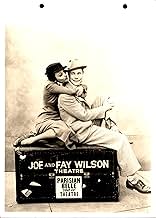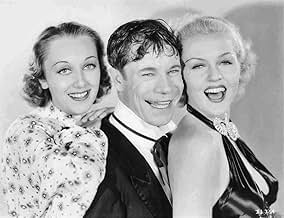Joe and Fay Wilson are a happily married vaudeville team. But when a reporter discovers, that one of the chorus girls in the troupe is a slightly eccentric heiress, who bugs sometimes out to... Read allJoe and Fay Wilson are a happily married vaudeville team. But when a reporter discovers, that one of the chorus girls in the troupe is a slightly eccentric heiress, who bugs sometimes out to do something strange (e.g. being a chorus girl in vaudeville), the manager decides that J... Read allJoe and Fay Wilson are a happily married vaudeville team. But when a reporter discovers, that one of the chorus girls in the troupe is a slightly eccentric heiress, who bugs sometimes out to do something strange (e.g. being a chorus girl in vaudeville), the manager decides that Joe had to do is act on Broadway -with the heiress- and the heiress falls in love with him,... Read all
- Ticket Clerk
- (uncredited)
- Postal Worker
- (uncredited)
- Vaudeville Team Member
- (uncredited)
- Backstage Worker in New York
- (uncredited)
- Chorus Girl
- (uncredited)
- The Ventriloquist
- (uncredited)
- Party Guest
- (uncredited)
Featured reviews
Bright Lights (1935) is perhaps Brown's most physical comedy. The former circus player uses his great acrobatic skills (even at age 43) in this movie about the heartbreaks of show business. He plays a small-time burlesque player teamed with his wife (Ann Dvorak) who gets discovered because of a runaway heiress (Patricia Ellis). They get into a big Broadway show but at the last minuted Dvorak is out and Ellis (big headlines) is in. Familiar plot.
But what is so special about Bright Lights is that Brown is just plain excellent. The burlesque routine is hilarious and extremely well acted and directed (Busby Berkley), even to the point that the audiences are good. Their reactions are great. Brown's likable persona is used well in this film. The acrobat sequence with the Maxellos is so spontaneous and funny you'd never think it was ever rehearsed! Along with Brown, Dvorak and Ellis also turn is nice performances. Ellis was a minor leading lady who never got anything to do in Hollywood. Here she is bright and funny and a good singer (she also looks great); Dvorak is remembered as a B drama queen, but she started in the chorus (Free and Easy with Buster Keaton) and gets to sing and dance here. Dvorak should have been a bigger star. The chemistry between Dvorak and Brown is great.
Good supporting cast includes William Gargan as the press agent, Henry O'Neill as the verbose director, Joseph Cawthorne as the burlesque director, Clarence Wilson as the ticket seller, Grace Hayle as the plane passenger, Arthur Treacher as the valet, Gordon Westcott as the pill, and William Demarest in a real bit part as the detective.
Lots of fun, good performances, plus the song "The Acrobat's Daughter."
The story revolves around Joe and Fay Wilson (Joe E. Brown and Ann Dvorak), a husband and wife team working for Oscar Schlemmer (Joseph Cawthorn), manager of a burlesque troupe, "Parisian Belle." Claire Whitmore (Patricia Ellis), a runaway heiress, posing as Miss Brown, sneaks on board a train to avoid a hired detective (William Demarest). Through Joe's help, she soon becomes part of the troupe. Dan Wheeler, press agent, recognizes Whitmore and sees a great opportunity teaming her with Wilson for J.C.Anderson's (Henry O'Neill) Broadway frolics. Although Joe refuses to split up his act with Fay, it is Fay who convinces Joe, though Dan's encouragement, to go on with the deal. The Wilson and Whitmore partnership at the Tivoli Theater proves successful. At first Fay is happy with their newfound success until she finds Joe, whom she affectionately calls "Funny Face," drifting away from her and spending more time with Claire, with whom he appears to have fallen in love.
With score composed by Bert Kalmar and Harry Ruby, songs include: "She Was an Acrobat's Daughter" (sung by Joe E. Brown); "Powder My Back For Me" (sung by chorus); "Toddling Along With You" (sung by Ann Dvorak/ by Mort Dixon and Allie Wrubel); "The Lady in Red" (danced briefly by Joe E. Brown and Patricia Ellis/ by Harry Warren and Al Dubin); "You're an Eyeful of Heaven" (sung by Patricia Ellis/ by Dixon and Wrubel); "Toddling Along With You" (reprised by Ann Dvorak). Although there are indications that the "Playboy of Paris" skit was filmed but ended up on the cutting room floor, all that remains in the finished product is Brown's character, sporting huge mustache and striped shirt, returning to his dressing room following the mentioned act.
Others members of the cast include Clarence Wilson (The Station Agent); Arthur Treacher (Wilbur, the Butler); Gordon Westcott, Tom Kennedy and Joseph Crehan in smaller roles.
Shifting from backstage theme to burlesque, BRIGHT LIGHTS contains a plot quite commonly place during the early sound era of 1929, with Paramount's THE DANCE OF LIFE and APPLAUSE immediately coming to mind. One virtually forgotten is MOLLY AND ME (Tiffany), which happens to be the earlier carnation of BRIGHT LIGHTS starring Belle Bennett and the one and only Joe E. Brown. For this version, there's extensive scenes of Brown reciting the poem, "Mousey" ; playing a dummy in a ventriloquist act participated by William B. Davidson; and Brown taking part of an acrobatic act in a night club sequence. There's a moment where one of the acrobats (The Maxellos) pushes Joe to a point of anger (looking all too real to be taken as part of the act or the movie itself) before suddenly extending out a handshake. Aside from Brown, there's Ann Dvorak as his second half of the act who showcases her ability as both actress and singer. Her dramatic moment towards the story's end is well played. Joseph Cawthorn resumes his familiarity with his accented character who adds more confusion with his broken English. Ranging from comedy to drama, the final half becomes the height of hilarity with Brown's trying efforts to retrieve a letter written to his wife he doesn't want her to read.
While not as noteworthy as other Brown comedies, or Busby Berkeley for that matter, BRIGHT LIGHTS, at 82 minutes, can be seen occasionally on cable TV's Turner Classic Movies. The best description for BRIGHT LIGHTS can be easily said through Brown's catch phrase, "Some fun." (**1/2)
Ann Dvorak plays his neglected wife. Dvorak was a beautiful and talented actress who made the most of even the most thankless part. She's the best thing about this film. Another performance of note is Henry O'Neill as a Broadway producer. It's fun to see a great character actor like O'Neill playing something besides a businessman or lawyer. Give this a shot if you're a fan of Joe E. Brown or Ann Dvorak. It's nothing groundbreaking but it's OK.
The film career of Joe E. Brown, Warner's rubber-faced comedian, essentially reached its zenith in this very enjoyable little comedy/drama obviously tailored for Joe's considerable skills. All too soon a change of studios would sidetrack Brown into cheaply made movies which would inevitably dim his celebrity. But here, in this backstage show biz story, his talents may still be enjoyed at full throttle.
Although the movie was directed by Busby Berkeley, it includes none of his celebrated dance extravaganzas, focusing instead on personality rather than pulchritude. The film is fortunate in that Brown, presented as a Broadway star, is genuinely funny when engaging in his slapstick humor. Whether dangerously balancing on a balcony rail as part of his stage act, using his tremendous mouth to great advantage while telling a party story about a 'little mousie,' or engaging in impressive nightclub acrobatic stunts with The Maxellos, Joe is never less than hilarious.
Although the focus is firmly on Brown, he is given able support from the rest of the cast: Ann Dvorak as his patient, long-suffering wife; Joseph Cawthorn as a fatherly theatrical troupe manager; William Gargan as an energetic press agent; and lovely Patricia Ellis as a stage bound heiress. William Demarest appears for a few seconds as a determined detective. Best of all is Arthur Treacher, wonderful as Brown's impeccable new valet.
Movie mavens will recognize sour faced Clarence Wilson as a train station clerk.
Did you know
- TriviaBecause wishing a fellow performer "Good Luck" is considered temping the evil eye and insuring bad luck, the term "break a leg" is ALWAYS used. However numerous times performets wish each other good luck in this movie
- ConnectionsFeatured in Daffy Duck in Hollywood (1938)
- SoundtracksShe Was an Acrobat's Daughter
(1935) (uncredited)
Lyrics by Bert Kalmar
Music by Harry Ruby
Sung by Joe E. Brown
- How long is Bright Lights?Powered by Alexa
Details
- Runtime
- 1h 22m(82 min)
- Color
- Sound mix
- Aspect ratio
- 1.37 : 1








































